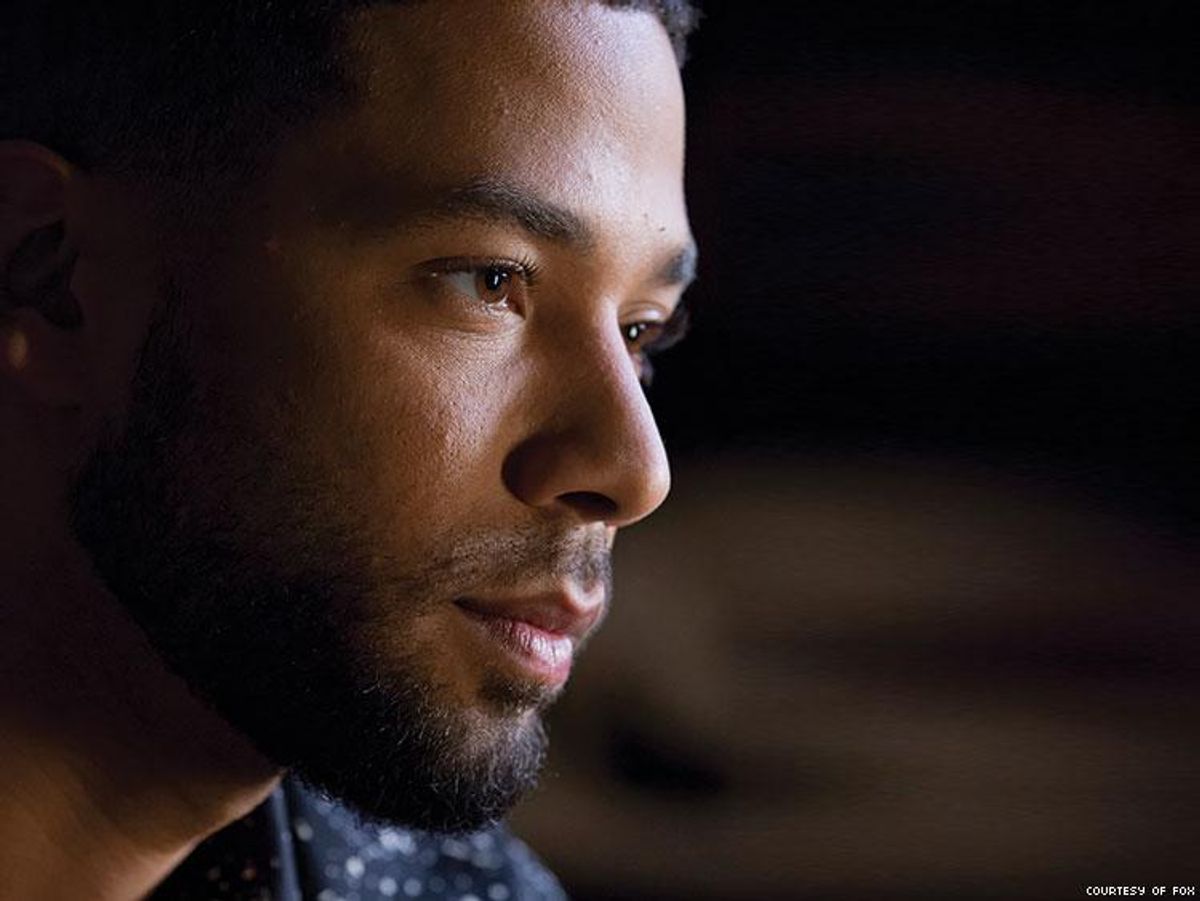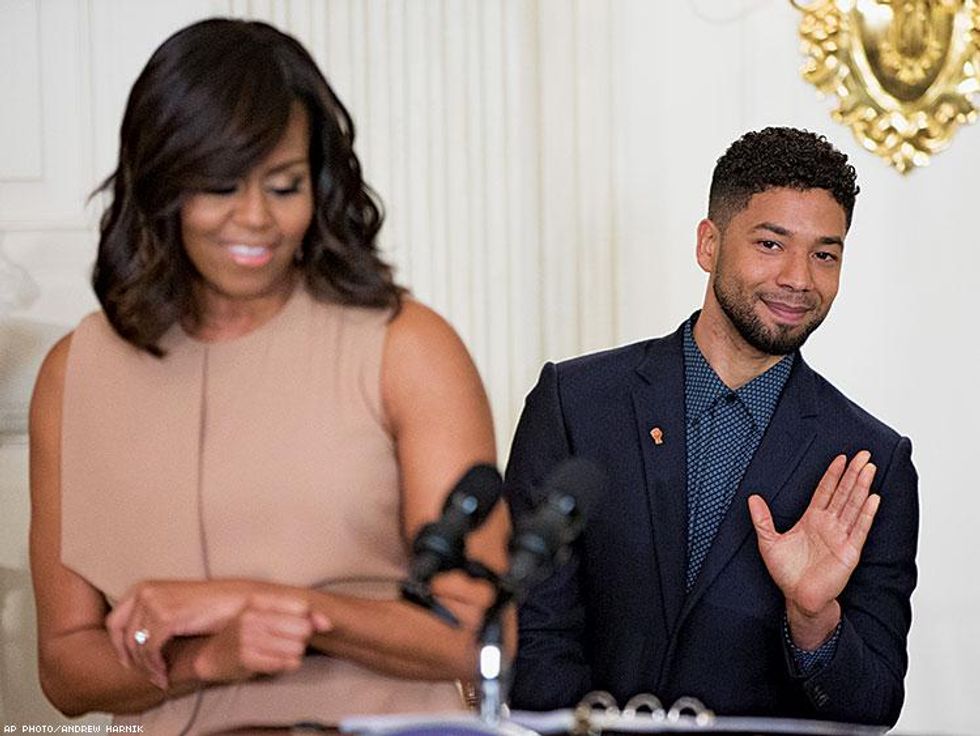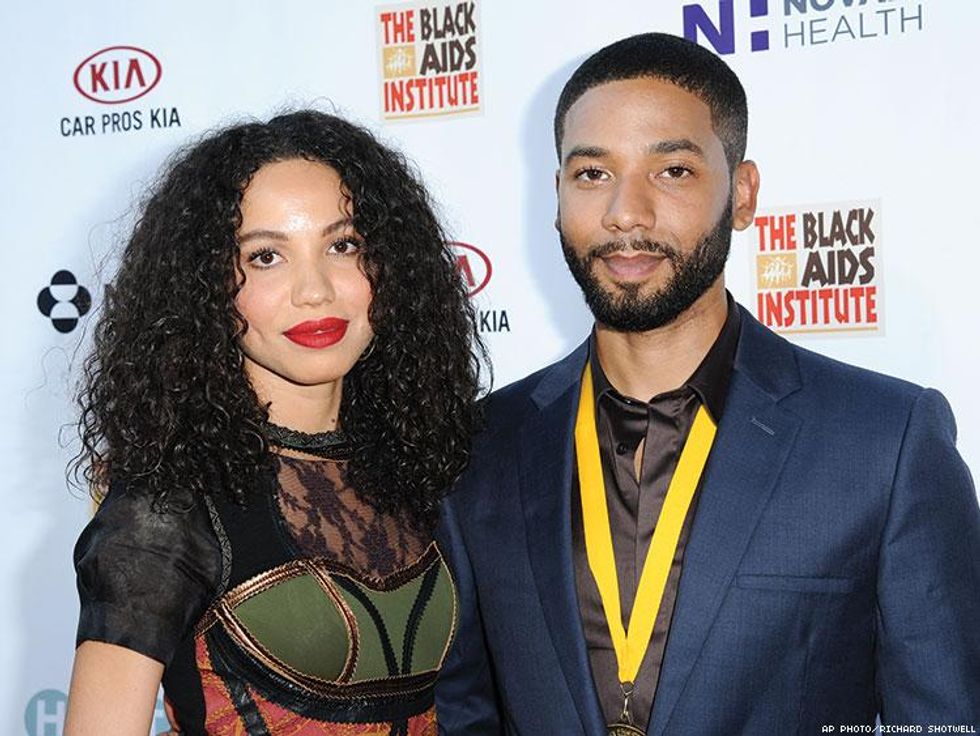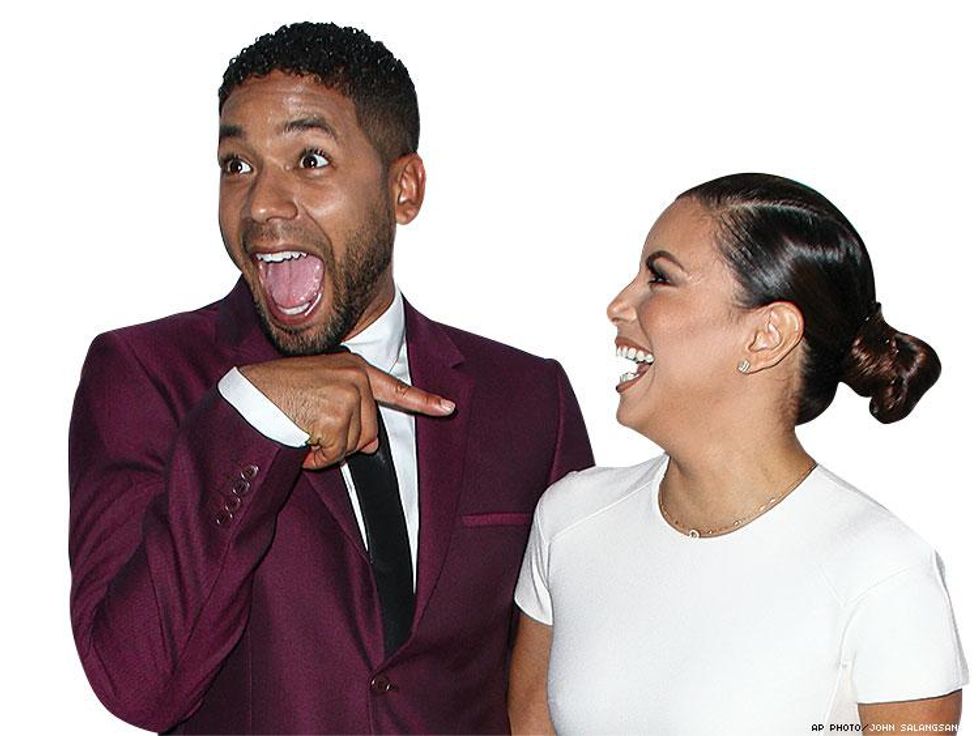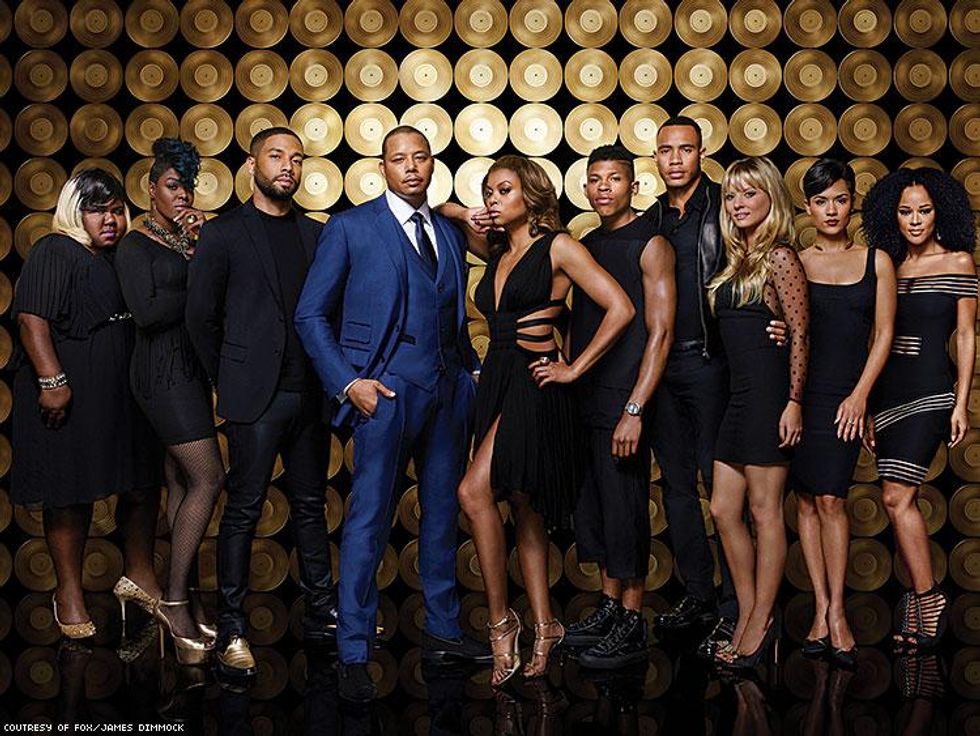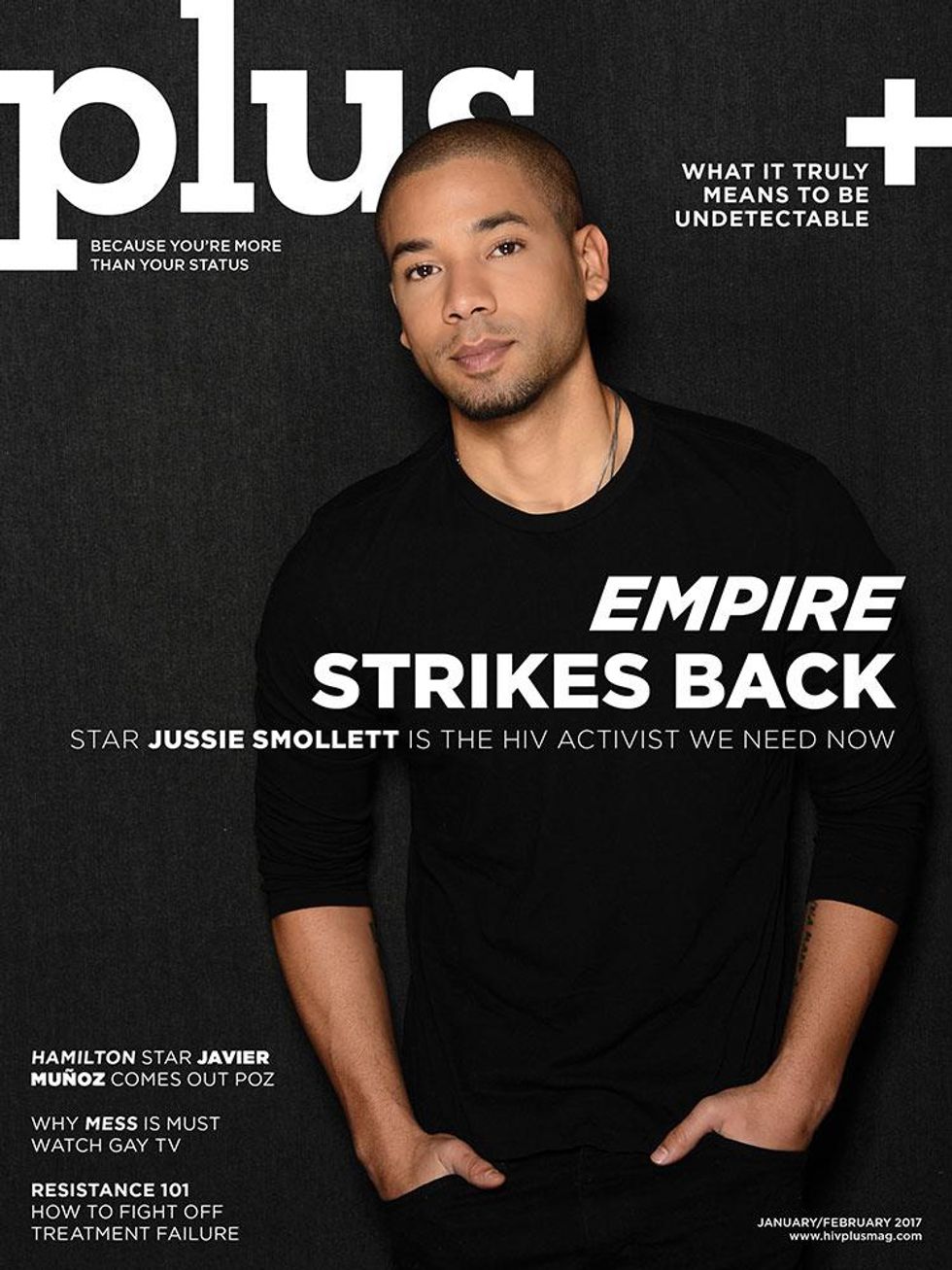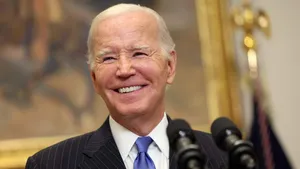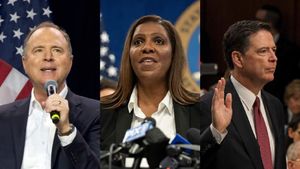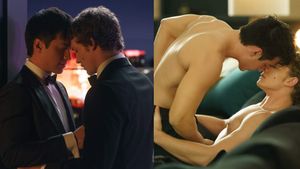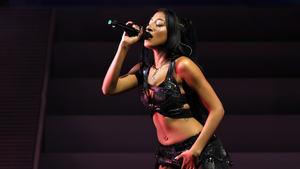The beauty of Hollywood is that TV stars seem to spring up out of nowhere. A guy becomes an “overnight” sensation, and suddenly half of America is dreaming about him in the bathtub. Never mind the decades of work prior; to American audiences it’s as if he never existed before. That’s the case with Jussie Smollett, star of Fox’s hit hip-hop drama, Empire.
A child actor in the early 1990s, Smollett starred in films like The Mighty Ducks and North; and, with his five real-life siblings, in the TV show On Our Own. After it was cancelled, Smollett took a ten year break from Hollywood, to shine as a different kind of star in the world of activism. Coming out as gay and being open about walking “truly in my blackness,” has gotten him a fair share of critics. (His response to detractors? “Thanks but no thanks, fuck you, and goodbye,” he told Attitude magazine earlier this year.)
There are few actors today willing to go where Smollet does. He doesn’t just share his opinions on broad cultural issues like race, LGBT rights, HIV, and politics. Smollet actually breaks open his heart to reveal his own worries as a Black gay man — and to advocate across the aisle for social justice for all.
Smollett began his activism as a child actor and has seen his career and his sense of global citizenry expand concurrently. Around performers all his life, he treats the Hollywood machinery more like an amusement than something he’s striving to be part of. He’s known celebs since childhood (including Naomi Campbell, who he first met as an 8-year-old). Some of his siblings are still acting (including True Blood’s Jurnee Smollett-Bell) and his mentor is Phill Wilson, CEO of Black AIDS Institute, the only national HIV think tank focused exclusively on African-Americans.
In 2017, Smollett will see his star go supernova. In February, he and Empire co-star Taraji P. Henson become the newest faces of MAC AIDS Fund’s VIVA GLAM campaign. He’ll also star in Ridley Scott’s sure-to-be-a-blockbuster movie, Alien: Covenant. And of course, he's stil on Empire, the TV show that’s now impacting everything from fashion and merchandising to the overall look of American television.
We asked comedian Sampson McCormick — Smollett’s good friend and another rising star — to have a sit-down with Smollett for Plus. It isn’t just a friendship that unites them. “We’re very proud of both our skin color and our sexualities, because for us, I think, both are equally important,” says McCormick, who admires Smollett’s deep commitment to justice. “That’s one thing I love about him. He’s an artist for sure, but he’s also very connected to real issues, and we need more people like him. To be a Black gay person, and to see others in the business… who use their voices to address the issues is [inspiring].”

Above: First lady Michelle Obama welcomes Jussie Smollett at the White House last year.
Smollett jokes that he and McCormick could be like Jerry Lewis and Dean Martin. It’s not hard to believe once you witness their comedic timing, vocal chops, and easy banter.
Sampson: We both try to use our voices to be a part of addressing social issues that affect our communities as Black, gay men. It’s not the cool thing to do. Why do you think it’s important to use art and our voices to deal with things like LGBT, homelessness, Black Lives Matter, or HIV issues?
Jussie: Well I’ve said this before: I believe that it is our responsibility, but I believe that it is our responsibility because we live on this planet. You know what I’m saying? And I just think that whatever our platform is, it’s our responsibility, and sometimes it seems like its more one group of people’s responsibility more than another because those are the ones that get the light shined on them. I’m no different [now that I’m famous]. My tweets are no different. My Instagrams are no different. The meetings that I go to are no different. The legislation that I pull for is no different, or the way that I pull for legislation, the marches that I go on, the way that I speak up is no different. It’s just that more people are listening now. That, if anything is my message, it’s that it’s not about, “Why is it the artist’s responsibility?” It’s, “Why is it the human being’s responsibility?” If we fucked up this world, we gotta clean it up. It’s a human being’s responsibility. It’s just that the artist, to me — sometimes we are told that we should shy away from what is our civic duty and what is just our rights and our duty as citizens. That somehow … we’re supposed to shut our mouths. So many times I’ve gotten … [asked], “Why don’t you shut up and stop talking about race? Don’t you have some acting to do?” First of all, that’s all you’ve got? That’s a whack-ass shit you’re gonna say. And it’s just really interesting and I’ve heard that before, but that’s just not my point of view, because I don’t approach it as an actor, I approach it as a concerned person who is affected by it because it’s happened to me, it’s happening to my sisters and my brothers and humanity. I just feel like if people are listening to you, you should have something to say.
SM: Absolutely.
JS: With the light and the platform that we have been given, I’m certainly not gonna shut up now. Now is not the time. Well it’s never the time. It’s never the time until it is the time.
SM: I do shows and I get protesters. I think I told you the Klan came to a show I did earlier this year. People get genuinely angry.
JS: You took that shit on like Bessie Smith.
SM: Yeah, I just went out and I was like, what y’all gonna do, huh? Y’all gonna try to do something to me? [Laughing] I mean, but we laugh at it, and we make fun out of it, and we deal with it in a lighthearted way. I’ve always believed that especially with Black folks, we’ve always used humor to overcome issues. But, I cannot figure out why people will take time out of their day [to protest performers]. Look at people like ministers for instance, who are in churches, who rather than ministering about the need to feed the hungry or clothe the naked or house the homeless, [they] move away from that and they’re more aggressive about demonizing the LGBT community. One big thing that I grew up listening to was that HIV was God’s punishment to gay people.
JS: Remember those shirts that ... I forget who was the rock star who wore it, and it said, “AIDS kills fags dead.” I remember seeing that and being like, wow. Here’s the thing. We don’t all have to see the world the same way. I think that [it]’s so important for us to get that message out. We don’t all have to see the world in the same way. You are actually allowed to feel that being gay is wrong. You are, absolutely, because I might think that your fucked up haircut is wrong. But you have the right to have that fucked up haircut.
SM: A lot of [people] who think gay rights are wrong, they have fucked up haircuts because they don’t have gay friends.
JS: You only become a horrible person when you violate my basic human rights. That is when it becomes a problem, when you start being the aggressor in two consenting adults and the life that they live. That is what makes you an asshole. It’s this lack of understanding, it’s this lack of care.

Above: Smollett and his sister, Jurnee, at the 16th Annual Heroes in the Struggle Gala in 2015.
SM: Why can’t people mind their damn business?
JS: Because everybody wants somebody to oppress. Really think about that. Everybody wants somebody to oppress, and that’s why even we who are oppressed — whether it be the LGBTQ community, whether it be communities of color, whether it be women — we are all oppressed communities, but even the oppressed want to oppress, because we’ve been taught by society that to be the oppressor means that we are the one that holds the power.
SM: Oh, you better preach.
JS: You know what I’m saying though? Everybody wants power. Everybody wants to be powerful. It’s just everybody projecting their own insecurities. Nobody — I’m telling you, I promise you — nobody really wants to be homophobic. Nobody really wants to be that way. We are a product of our environment and what we are taught, and we are taught to believe that we are supposed to be that way.
SM: Wow.
JS: Trust me, I see it. People don’t want to be homophobic. People are taught that that is the way that you are not a homosexual, is to be homophobic. The real motherfuckers who are really, really secure in themselves, they don’t give a fuck who I love. They don’t give a fuck. They chillin’ with their girl. Like, they good. They are not concerned with who I’m dealing with. That’s just not their type, just like they may not like a blonde. They may not like a brunette. You feel me? I have three straight brothers.
SM: Right, they don’t care.
JS: [Homophobia] is the brainwashing of society. It’s the poisoning of hate. That’s what it is. One of my biggest mentors, Phill Wilson, after the Charleston shootings, I was so low, and it was right when I was being honored at the Heroes in the Struggle last year. And I was so down, I could not stop. It was one of the first times that I felt just completely defeated. [Phill] said to me and Jeremy, he said it like this:“These are extremely, extremely desperate people. They are such desperate people, because hate is so desperate right now, because hate is going to lose.” When hate is gonna lose, hate starts getting real low, hate starts getting real, trying everything. Well, I’m gonna shoot you; well I’m gonna do this. That’s what hate does. That’s what Donald Trump does.

Above: Smollett and Eva Longoria pal around at HollyRod’s 17th Annual DesignCare Gala in 2015.
SM: You think that’s where Donald Trump came from?
JS: Absolutely. I think that these are desperate times, desperate, desperate, desperate people. I’m not saying that every single Donald Trump supporter is a desperate person. No, actually I am. I am, but [he is] playing to people’s fears, fears of being less powerful. What happens if somebody walks up to you when you were a kid, and a new baby is born, and somebody walks up to you and is like, “Oh you’re not the baby no more. Oh, you’re not the hottest one no more.” You are filling this person’s mind as if they are supposed to be competing with this other person. Therefore, there is going to be some sort of resentment to that other person. And that’s what society does. That’s what hate does. That’s what racists and bigots and all of them do. And homophobes, that’s what happens. I didn’t need Donald Trump to come along to tell me that the United States is racist, and the most desperate people are now gonna flip the script and call [us] the villain. All of a sudden, these other people —.
SM: Yeah, but you know what though? Some people did need Donald Trump to come along to show us that the nation is racist. I mean, I knew this country was racist … systemically racist, systemically homophobic, and sexist and all these different things. But to see it and listen to these people — who are part of these militias and things — threaten to go stand outside of voting places, polling places, and intimidate voters … I don’t want to say it’s frightening, but … I was appalled, I was shocked. I don’t know how to feel about it. I’m very paralyzed by that feeling, like the fact that these are elderly people going to vote, these are disabled people, these are people who need to have a voice and [the racists are] basically using violence to try to suppress people. It’s that last effort to maintain this ridiculously hateful power.
JS: Sometimes I feel like I can’t even talk about it because it makes ... You know when your blood starts feeling like its boiling over your heart? You ever had that feeling?
SM: Oh honey, when they don’t send my checks on time, yes.
JS: Oh lord, help us all. No, but that is that feeling, but that … feeling of the fake intimidation.
SM: Let's talk about HIV.
JS: HIV has been stigmatized and even criminalized. Why is that? I don’t think that it’s really up for debate that if [HIV] all of a sudden started really attacking white heterosexual men, it would be taken very seriously. I mean, am I wrong? It would be taken very, very seriously.
SM: I know you’ve always been a very big advocate for social justice around HIV. Why has that been so important to you?
JS: When I was young, we were really close to someone that worked on the set of our show, in the early ’90s. And he all of a sudden just disappeared, and he was gone for a couple weeks, then maybe two months, and then… my mom told us that he passed. He had passed away from AIDS [complications]. I was 10 and it was devastating. I remember the feeling of devastation. I remember being young and thinking, we loved him so much just from working with him for a couple months, imagine how his family feels.
My mother was always the advocate for justice in any form, so we started learning more and more and more and more about HIV, AIDS, and just from there really did get truly involved. We started working with Artists for a New South Africa when I was about 14. Phill Wilson became one of my mentors when I was 16, and I started volunteering with the Black AIDS Institute, and then started working for Artists for a New South Africa … which was a group of artists led by Alfre Woodard and Carlos Santana and Samuel L. Jackson and LaToya Jackson and these amazing players, these amazing artists, they all came together. During apartheid, it was Artists for a Free South Africa, and then they changed it after apartheid was gone and Mandela became president.They changed it to Artists for a New South Africa, and I worked there for five years in the office, raising funds for children infected and affected by HIV and AIDS in South Africa and also in the states. It’s one of the things that we are about. And I just feel like, in this day and age, it’s kind of — I hate this term, but it’s not necessarily this "sexy" thing to care about anymore. I understand that there are so many things in the world happening, but we have to care about this also. We just have to. If you sit idly by and you get content with what’s going on than you end up … believing that we’re done, when we’re just not. Contentment can easily lead to apathy.
SM: Definitely. I think a lot of people have gotten [complacent] … people seem to have a more nonchalant attitude about HIV and AIDS.
JS: That’s the thing, though. With every single progress that you make in any situation, it just means that the root of the issue has to be talked about more. Now you don’t have to worry about getting tested, you don’t have to worry about this, you don’t have to — No! No, no, no, no, no, no. It doesn’t work like that. This is not a cure. This does not protect you from other things. We still have to take responsibility for ourselves and each other. I don’t want that to somehow … end up losing more … because we’re being careless through the progress.
SM: HIV is a global issue; something that we all are definitely affected by. But if you look at the statistics it’s clear to see that in the Black community, Black folks — whether they’re gay, bi, or straight — are disproportionately affected by HIV and AIDS. What do we do as a community to bring light to the issue, really start taking it seriously, and most of all, make a change in the community?
JS: We have to mobilize. We have to educate ourselves. I think about [this question] all the time. I wish that I had an answer that I could really be proud of instead of saying the same old shit: “We have to discuss it, we have to get tested, we have to talk to our partners.” I know that to be true, but now I want to talk more. I want to talk about what else can we do, though, because there has to be something else. That’s the discussion I would really like to start: What else can we do? Because I wish that we could start to admit that we’re kind of hitting a wall. And I wish that we could admit that we don’t know what we’re supposed to do. That discussion in itself is so important.
SM: Right, right, right.

Above: Smollett as Jamal with the Empire cast.
JS: We all know that we’re supposed to get tested. We all know that ... Or maybe we don’t. Actually, we don’t all know that, so fuck that. Fuck what I just said. We all need to talk more about this. No, but seriously, we all need to talk more about the things that we don’t know, and we also need to talk about the things that we do know. There’s so many on both sides. I may not know something, and I may talk about the fact that I don’t know this, and you may know the answer. I may talk to you about something that I do know that you don’t know. We need to sit there and open up some sort of [dialogue]. It just crushes me that people in this day and age still feel alone and still feel ashamed and they still feel this stigma put upon them.
That’s what breaks my heart: in 2017, there are still people living in chains of who they are, of what they’re going through, and in turn, shame leads to denial, denial leads to irresponsibility. We can talk about this forever. I hope y’all got enough sound bites to get the damn, real message across. Can I be honest with you? Sometimes these interviews get on my nerves … I’m not saying this interview in particular, this interview feels good because it’s with a friend, it’s about something real. But sometimes these interviews ... they get on my nerves because it’s almost like people are just looking for the next sound bite, [they] don’t want have a real discussion about what the fuck is going on.
SM: You’re about to open up another can of worms.
JS: They don’t really want to open up that discussion. They really just want to talk about what they’re comfortable enough talking about and knowing in order to let them sleep at night. They put up a sound bite from an activist or an artist or something like that that people might see. Are we really, really seeing what is happening out there? Are we really, really seeing what people are going through? Or are we just figuring this is something to write about today, this is something to talk about today? I don’t know. I just feel sometimes like we’re so caught up in cliches and hashtags and all this type of stuff that we’re not really even thinking about what really to do to solve the problem. We’re always talking about the problem, but what is the solution? Let’s start talking about the solutions.

SM: And what about a cure?
JS: Don’t get me started. I truly believe that there is a cure out there. And the moment that we can actually get out there, we can actually get the governments to finally make money off of that cure, maybe we will see it.
SM: Well, I got to talk to you off record.
JS: Let me go call my security detail, because after this I’m gonna need extra security. No, I mean, y’all can print that shit. Honestly. It’s true.
SM: I think so too, because I mean [someone’s] gonna make money.
JS: But here’s the thing. Until we can uncover that [cure], you gotta take your fucking meds and you gotta get fucking tested!
SM: Absolutely. Absolutely, and take care of yourselves.
JS: Please, please, please. Hey, I’m not the one that’s sitting here being like, “Believe everything that’s said to you.” I am the one that’s being like, “Listen, until we can really uncover that [cure], until we can really uncover that, I need for y’all to fucking get tested, and I need for you to be responsible. I need for you to get treatment, and I need for you to take care of yourself.”
SM: Well I think you can drop the mic on that one, because it is what it is.
JS: I’m dropping the mic.
Find out more about Sampson McCormick here.
Edited by Diane Anderson-Minshall
Additional research by Savas Abadsidis
